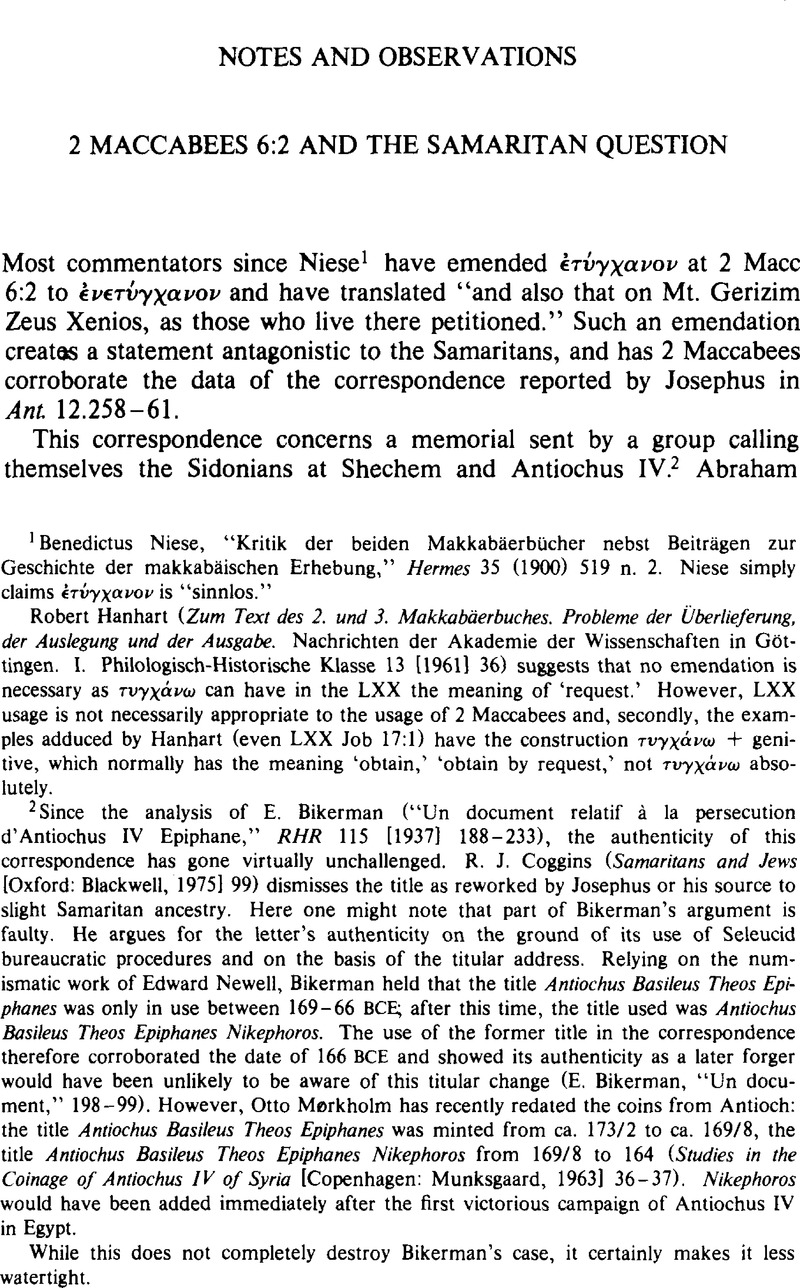Published online by Cambridge University Press: 10 June 2011

1 Niese, Benedictus, “Kritik der beiden Makkabäerbücher nebst Beiträgen zur Geschichte der makkabäischen Erhebung,” Hermes 35 (1900) 519Google Scholar n. 2. Niese simply claims ⋯τύγχανον is “sinnlos.” Hanhart, Robert (Zum Text des 2. und 3. Makkabäerbuches. Probleme der überlieferung, der Auslegung und der Ausgabe. Nachrichten der Akademie der Wissenschaften in Göttingen. I. Philologisch-Historische Klasse 13 [1961] 36)Google Scholar suggests that no emendation is necessary as τυγχάνω can have in the LXX the meaning of ‘request.’ However, LXX usage is not necessarily appropriate to the usage of 2 Maccabees and, secondly, the examples adduced by Hanhart (even LXX Job 17:1) have the construction τυγχάνω+ genitive, which normally has the meaning ‘obtain,’ ‘obtain by request,’ not τυγχάνω absolutely.
2 Since the analysis of Bikerman, E. (“Un document relatif à la persecution d'Antiochus IV Epiphane,” RHR 115 [1937] 188–233)Google Scholar, the authenticity of this correspondence has gone virtually unchallenged. Coggins, R. J. (Samaritans and Jews [Oxford: Blackwell, 1975] 99)Google Scholar dismisses the title as reworked by Josephus or his source to slight Samaritan ancestry. Here one might note that part of Bikerman's argument is faulty. He argues for the letter's authenticity on the ground of its use of Seleucid bureaucratic procedures and on the basis of the titular address. Relying on the numismatic work of Edward Newell, Bikerman held that the title Antiochus Basileus Theos Epiphanes was only in use between 169–66 BCE; after this time, the title used was Antiochus Basileus Theos Epiphanes Nikephoros. The use of the former title in the correspondence therefore corroborated the date of 166 BCE and showed its authenticity as a later forger would have been unlikely to be aware of this titular change (E. Bikerman, “Un document,” 198–99). However, Otto Mørkholm has recently redated the coins from Antioch: the title Antiochus Basileus Theos Epiphanes was minted from ca. 173/2 to ca. 169/8, the title Antiochus Basileus Theos Epiphanes Nikephoros from 169/8 to 164 (Studies in the Coinage of Antiochus IV of Syria [Copenhagen: Munksgaard, 1963] 36–37)Google Scholar. Nikephoros would have been added immediately after the first victorious campaign of Antiochus IV in Egypt.
While this does not completely destroy Bikerman's case, it certainly makes it less watertight.
3 Schalit, Abraham, “Die Denkschrift der Samaritaner an König Antiochus Epiphanes zu Beginn der grössten Verfolgung der jüdischen Religion im Jahre 167 v. Chr.,” ASTI 8 (1970–1971) 131–83Google Scholar.
4 Josephus Ant. 1.240–41.
5 Note how Haggai (1:2–11; 2:15–19) admonishes the refugees that times have been bad because they have not built a temple to Yahweh, and how Neh 13:18 (cf. 10:31–32) connects bad times with lack of Sabbath observance.
6 Schalit, “Die Denkschrift,” 143–47.
7 As does Purvis, James D. (“The Samaritan Problem: A Case Study in Jewish Sectarianism in the Roman Era,” in Halpern, Baruch and Levenson, Jon D., eds., Traditions in Transformation: Turning Points in Biblical Faith [Winona Lake, IN: Eisenbrauns, 1981] 33)Google Scholar, who refers to a forthcoming article “The Samaritans” in Cambridge History of Judaism, vol. 2 (ed. William D. Davies and Louis Finkelstein). Delcor, Mathias (“Von Sichem der hellenistischen Epochen zum Sychar des Neuen Testamentes,” ZDPV 78 [1962] 34–48)Google Scholar is the main proponent of the Sidonian colony view, and is followed in this by Kippenberg, Hans Gerhard, Garizim und Synagoge: Traditionsgeschichtliche Untersuchungen zur samaritanischen Religion der aramäischen Periode (Berlin: De Gruyter, 1971) 79.CrossRefGoogle Scholar
8 Bikerman does not discuss the seeming discrepancy between this text and the characters in Ant. 12.261 where the Sidonians at Shechem complain about Apollonius the μεριδάρχης and Nicanor the royal agent. Usually these are identified with Apollonios the Mysarch of 2 Mace 5:24 and Nicanor of 2 Mace 8:9. This Nicanor, however, has no role in Samaria. Schalit (“Die Denkschrift,” 166 n. 9) is probably correct in seeing this as another otherwise unknown Nicanor.
9 This was already noted by Smith, Morton, Palestinian Parties and Politics that Shaped the Old Testament (New York: Columbia University, 1971) 189–90.Google Scholar
10 Smyth, Herbert Weir, Greek Grammar (Cambridge, MA: Harvard University, 1971) 674–76 (3017–18).Google Scholar
11 Smyth, , Greek Grammar, 425 (1898).Google Scholar
12 On the identification, see Hengel, Martin, Judaism and Hellenism (Philadelphia: Fortress, 1974) 1.263–66, 285–86.Google Scholar
13 Ibid., 2. 196.
14 Freudenthal, Jacob, Hellenistische Studien: Alexander Polyhistor und die von ihm erhaltenen Reste jüdischer und samaritanischer Geschichtswerke (Breslau: Friedrich, 1874) 82–103.Google Scholar
15 For a fuller discussion of this position, see Doran, Robert, “Pseudo-Eupolemus,” in Charlesworth, James H., ed., The Pseudepigrapha (New York: Doubleday, 1983).Google Scholar
16 See Wacholder, Ben Zion, Eupolemus: A Study of Judaeo-Greek Literature (Cincinnati: Hebrew Union College, 1974).Google Scholar
17 See Doran, Robert, Temple Propaganda: The Purpose and Character of 2 Maccabees (CBQMS 12; Washington, DC: Catholic Biblical Association, 1982).Google Scholar
* After completing this manuscript, I became aware of the article by Pummer, Reinhard (“Antisamaritanische Polemik in jüdischen Schriften aus der intertestamentarischen Zeit” BZ 26 [1982] 224–42)Google Scholar in which he treats passages from Jubilees, Judith, the Testament of Levi, Theodotus, and 2 Maccabees. In discussing 2 Mace 6:2, Pummer holds that the verse is not anti-Samaritan, but does not attempt an explanation of the attitude revealed in it.